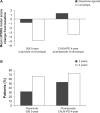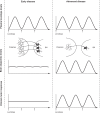Levodopa in the treatment of Parkinson's disease: an old drug still going strong
- PMID: 20852670
- PMCID: PMC2938030
- DOI: 10.2147/cia.s6456
Levodopa in the treatment of Parkinson's disease: an old drug still going strong
Abstract
After more than 40 years of clinical use, levodopa (LD) remains the gold standard of symptomatic efficacy in the drug treatment of Parkinson's disease (PD). Compared with other available dopaminergic therapies, dopamine replacement with LD is associated with the greatest improvement in motor function. Long-term treatment with LD is, however, often complicated by the development of various types of motor response oscillations over the day, as well as drug-induced dyskinesias. Motor fluctuations can be improved by the addition of drugs such as entacapone or monoamine oxidase inhibitors, which extend the half-life of levodopa or dopamine, respectively. However, dyskinesia control still represents a major challenge. As a result, many neurologists have become cautious when prescribing therapy with LD. This review summarizes the available evidence regarding the use of LD to treat PD and will also address the issue of LD delivery as a critical factor for the drug's propensity to induce motor complications.
Keywords: Parkinson’s disease; dyskinesia; levodopa; motor fluctuations.
Figures




References
-
- Olanow CW, Agid Y, Mizuno Y, et al. Levodopa in the treatment of Parkinson’s disease: Current controversies. Mov Disord. 2004;19(9):997. - PubMed
-
- Holloway RG, Shoulson I, Fahn S, et al. Pramipexole vs levodopa as initial treatment for Parkinson disease: A 4-year randomized controlled trial. Arch Neurol. 2004;61(7):1044–1053. - PubMed
-
- Rascol O, Brooks DJ, Korczyn AD, et al. A five-year study of the incidence of dyskinesia in patients with early Parkinson’s disease who were treated with ropinirole or levodopa. 056 Study Group. N Engl J Med. 2000;342(20):1484–1491. - PubMed
-
- Rinne UK, Bracco F, Chouza C, et al. Early treatment of Parkinson’s disease with cabergoline delays the onset of motor complications. Results of a double-blind levodopa controlled trial. The PKDS009 Study Group. Drugs. 1998;55(Suppl 1):23–30. - PubMed
-
- Oertel WH, Wolters E, Sampaio C, et al. Pergolide versus levodopa monotherapy in early Parkinson’s disease patients: The PELMOPET study. Mov Disord. 2005;21(3):343–353. - PubMed
Publication types
MeSH terms
Substances
LinkOut - more resources
Full Text Sources
Other Literature Sources
Medical
Research Materials

